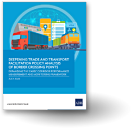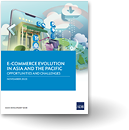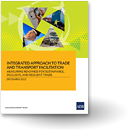Spotlight Archives
- ADB Seminar Series on Regional Economic Integration: Future Challenges of Asia's Trade Policy (13 December 2010, 10:00 - 11:30 am, Auditorium Zones C and D, ADB Headquarters, Manila)6 December 2010
- ADB Working Paper Series on Regional Economic Integration No. 64 - Institutional Design of Regional Integration: Balancing Delegation and RepresentationNovember 2010London School of Economics and Political Sciences' Simon Hix assesses the convergence of national preferences, establishment of equitable systems of representation, and institutional scenarios for Asian economic union. Read more.
- ADB Working Paper Series on Regional Economic Integration No. 65 - Regional Judicial Institutions and Economic Cooperation: Lessons for Asia?November 2010Why is Asia lagging behind other regions in creating regional judicial institutions? What lessons from elsewhere could be valuable to Asian regional economic integration? This paper shows that Asian states are not unusually averse to refer inter-state disputes to global judicial institutions. Moreover, Asian states are not unique in their reluctance to resolve regional inter-state disputes through judicial means. The most valuable lesson for Asia from experiences elsewhere is the role that regional courts can play in resolving disputes between administrative agencies and private parties about the implementation of international law. Read more.
- ADB Working Paper Series on Regional Economic Integration No. 66 - The Awakening Chinese Economy: Macro and Terms of Trade Impacts on 10 Major Asia-Pacific CountriesNovember 2010In this paper, Yin Hua Mai, Phillip Adams, Peter Dixon and Jayant Menon examine the impact that an awakening People’s Republic of China (PRC) is likely to have on the growth and terms of trade of its neighbours. Using a multi-country model, they find that PRC’s technological convergence raises the world prices for mining products and lowers those for manufactures. Overall, the effects are relatively small, however. Therefore, although an awakening PRC will have a positive impact on the region, it is unlikely to make a dramatic entrance. Read more.
- ADB Working Paper Series on Regional Economic Integration No. 62 - Organizing the Wider East Asia RegionNovember 2010Regionalism and regional integration in East Asia have developed dynamically at various levels over the past two decades. This paper by Christopher M. Dent examines the development of new regional institutions involving the whole East Asia region. Read more.
- ADB Working Paper Series on Regional Economic Integration No. 63 - Labor and Grassroots Civic InterestsNovember 2010Regional institutions fail to tap the information and knowledge resources of civil society organizations to enhance the quality of regional institutional governance, defined as the effectiveness of governance institutions as well as their accountability to stakeholders. This paper by Helen E.S. Nesadurai suggests three strategies to overcome this deficit. Read more.
- ADB Working Paper Series on Regional Economic Integration No. 60 - Responding to the Global Financial and Economic Crisis: Meeting the Challenges in AsiaOctober 2010Based on a review of international and regional responses to the global financial and economic crisis and its implications for finance in Asia, Douglas Arner and Lotte Schou-Zibell draw lessons for Asian financial systems with regard to the scope of regulation; financial standards; supervision, regulation, and infrastructure; financial crises resolution; financial sector development; and strengthened regional financial architecture. They conclude with a discussion of challenges and policy options. Read more.
- ADB Working Paper Series on Regional Economic Integration No. 61 - Shaping New Regionalism in the Pacific Islands: Back to the Future?October 2010The present day Pacific Island region hosts fourteen sovereign nations. Some of these nations comprise a few thousand people and thus constitute the smallest of sovereign nations around. In this paper, Satish Chand provides the history leading to the creation of these nation states and then charts the potential path to regional integration for them. It is argued that while international trade in goods and services do not constitute a strong motivation for regional integration, common concerns regarding climate change and security do. Read more.
- ADB Gives Keynote Presentation at the Philippine Trade Policy Forum19 October 2010OREI's Ganeshan Wignaraja gave a keynote presentation on Business Participation in FTAs at a forum organized by the Philippine Chamber of Commerce and Industry on 14 October. Other keynote speakers include UK Ambassador to the Philippines Stephen Lillie, Philippine Trade and Industry Secretary Gregory Domingo and Justice Secretary Leila de Lima. Download the presentation.
- ADB Working Paper Series on Regional Economic Integration No. 59 - Methods for Ex Post Economic Evaluation of Free Trade AgreementsOctober 2010This paper by David Cheong presents methods for evaluating the trade and welfare effects of an FTA after its establishment. The paper shows how to assess (i) the utilization and value of preferences, (ii) trade creation and diversion, and (iii) the FTA’s welfare effects using trade indicators and the gravity model. Countries such as Viet Nam, Indonesia, and Cambodia feature in the examples. Read more.




